- Home
- Christie Golden
Ghost Dance
Ghost Dance Read online
Thank you for purchasing this Pocket Books eBook.
* * *
Sign up for our newsletter and receive special offers, access to bonus content, and info on the latest new releases and other great eBooks from Pocket Books and Howard & Schuster.
CLICK HERE TO SIGN UP
or visit us online to sign up at
eBookNews.SimonandSchuster.com
Contents
Chapter 1
Chapter 2
Chapter 3
Chapter 4
Chapter 5
Chapter 6
Chapter 7
Chapter 8
Chapter 9
Chapter 10
Chapter 11
Chapter 12
Chapter 13
Chapter 14
Chapter 15
Chapter 16
Chapter 17
Chapter 18
Chapter 19
Epilogue
About the Author
This book is dedicated to the memory of Mark Lenard
The noblest Romulan—and Vulcan—of them all
INTERLUDE
THE ENTITY HAD NO FORM, BUT IT COULD SEE, SMELL, taste, touch, hear, and sense. It had no mind, but it thought thoughts that went back to the very beginning of time, and dared reach forward to contemplate time’s end. It was in all places and none, and in this place that was no place, it was content.
It drifted, thinking its vast thoughts and touching places in and out of time and space. Here, the Entity knew joy as it recalled something as simple, as unique, as an image of a beloved face. There, it tasted profound sorrow as an entire species blinked out of existence. It knew these emotions simultaneously and was in no way troubled by the conflicts. It simply drifted, dreaming.
The Entity was perhaps the single most powerful being in this or any universe, and it was as fragile as a spiderweb blown away by an errant wind.
It knew its complexities and contradictions, but always, the Entity had reveled in them alone.
Until now.
CHAPTER
1
THE SWEET, THICK SMOKE FROM THE BURNING LEAVES of the Sacred Plant wafted upward, wrapping the Culil in its gray embrace. Culil Matroci struggled not to cough, instead telling himself that the smoke was holy, it purified him, and it was only his weak, fleshly lungs attempting to resist the presence of the Divine.
If only he had the courage, as the Culil before him had, to lock himself into a closed room and let the holy smoke from the Sacred Plant fill up those fleshly lungs until he was entirely one with the spirit world. But Matroci was young, and sometimes the delights of the flesh were sweeter to him than the smoke of the Sacred Plant.
Sacrilege! his training screamed at him, and inwardly Matroci quailed at his lapse. Tonight, before he snatched what little sleep his position permitted, he would have to spend an extra session with the Sacred Plant smoke to purge himself of his blasphemy.
Still, he always kept a window open.
It was the Strangers who had done this to him, unsettled him so that he could not think with the peace and clarity that a Culil ought. It was not unusual for the Culilann to meet beings from other worlds, though it had seldom happened in Matroci’s village of Sumar-ka. Was that not the first of the ninety-nine Chants? “Never think you are alone. The works of the Crafters are multitude, and little have you seen of them.” Such encounters often proved mutually beneficial. Of course, that was after the Ordeal had been completed, something any representatives of a completely new race must undergo. This time, the Ordeal was proving to be precisely that, and Matroci could not find it in him to approve.
Despite his efforts, Matroci found himself thinking about them, even though this was supposed to be a time of deepest prayer and inward contemplation. His sanctuary, large and roomy to befit his august office, was decorated with furnishings of both grace and utility. Handcrafted, of course, to honor the Crafters. Only the Alilann artificially manufactured anything. Such unimaginative products were scorned by true Culilann, and the Culil would lose his office if he dared allow them in the sanctuary. So for the comfort of the Culil there were pillows and rugs upon which to recline, woven and sewn and stuffed by those who cared for the soft-furred simli, chairs crafted from the trunks of the Sacred Plant as well as other woods, bowls and cups spun on a turning wheel while clever fingers worked them into objects of almost unspeakable beauty. Beverages, pressed by steady tramping feet, filled those cups; fruits and vegetables harvested by free-hearted labor adorned the table, waiting to be consumed.
Sometimes, Matroci wondered why the Culil accepted such beautiful things when his position required him to mortify his flesh and shun such niceties. The dictates of the Crafters were sometimes rather confusing. On the one hand, it was clear in the writings that the Culil was not to take active pleasure in gifts. On the other, it was also written that the people were to honor the Culil with the labor of their hearts and hands, thus also honoring the Crafters. So Matroci was in the awkward position of having to accept gifts he was forbidden to truly use and enjoy.
He sometimes wished he were not so high ranking. He’d have fewer pretty things, but at least then he could appreciate them openly and honestly as the rest of the Culilann did.
The smoke was dissipating, thank the Crafters. His lungs still burned, but not quite so much as before. After a few more moments, the fire had consumed all the dried leaves, and there was only the faintest trace of their sweet scent clinging to Matroci’s heavy robes and long, pale blue hair.
He prostrated himself in front of the altar, asked forgiveness for his wayward thoughts, and rose. He bathed his face with the herb-scented water and let it dry on his blue-hued skin. Droplets traced their way down his shaven chin and neck and past his high collar, and the cool dampness was annoying.
Trials, that’s all every hour brought. More tests, more trials of his faith. Matroci wished he were not quite so young. It seemed that the Elders were much more entrenched in the faith than he was.
He rose, stretched, poured himself a cool drink from one of those beautifully wrought pitchers, and sipped the tangy beverage slowly. He tried not to think about how delicious it was, and how beautifully made was the goblet that held it.
There was a soft knock on his door. Matroci sighed and called, “Enter.”
It was Trima, his Sa-Culil. She stood straight and tall, her long blue hair falling past her buttocks. Since the day she was pledged to the Crafters, Trima had never cut it. It was an old tradition, hardly followed much anymore. Matroci himself had been forced to cut his long locks a few turns ago when he’d gotten them hopelessly snarled, but as far as he knew, Trima had proudly let her hair grow longer and longer, untouched by shears if not by comb.
It was thick and glossy and quite beautiful, and not for the first time Matroci wondered what its heavy lengths would feel like between his fingers. But Trima was his responsibility, and he would no more act on his feelings than he would leap off the thatched roof thinking he could fly.
He placed his fingers first on his temples, then on his throat, then on his belly in the ritual threefold gesture that Trima always expected. She returned it in kind, executing the movements with exquisite grace.
“Greetings, Sa-Culil,” said Matroci. “What is it you require of me? It is not time for your training sessions.”
“No, good Culil.” Her voice was as sweet as the bell that rang to call them all to prayer at sunsrise. She paused for a moment and inhaled deeply, breathing what remained of the sacred smoke. She never coughs, Matroci thought sourly.
“I come from Soliss. He tells me that the Strangers are not healing well, despite the holy waters with which they have been anointed and the prayers we have said for them, even though they are—”
Her voice caught, and her eyes widened a little. Matroci felt for her then. Trima liked to project such an image of peace, of tranquility. She had been the one to find the Strangers, wandering bleeding on the holy ground, and the whole incident had clearly upset her. Their torn, broken bodies were nothing of peace and tranquility.
But the words of the Crafters were clear. These were Strangers of the most terrifying sort, utterly unknown, and the Culilann were not to provide any aid other than spiritual for a certain number of days. If they survived, then the Culilann would attend to their physical needs with all the hospitality the Crafters bade them show. If they died, then the Crafters had spoken.
Personally, Matroci didn’t like it any better than Trima seemed to, but there wasn’t much he could do. Soliss, the Minister of the small village, was the worst of all. It was in him to heal, and to sit by and watch anyone suffer, even Strangers as alien as these two, must be awful.
A thought came to him. “They must eat of the Sacred Fruit,” he said.
Trima frowned primly, if such a thing were possible. “That is a rare sacrament, as you must surely know, Culil. Even we who are called to serve the Crafters do not partake other than at Midtime.”
“We are bound to offer spiritual aid,” said Matroci, standing up straighter. “Surely letting them partake of the Sacred Fruit is offering such aid.”
“Yes, but—”
“Who is Culil, Trima?”
She colored at that, pale blue suffusing her soft, rounded cheeks. “You are, of course.”
“You will do well to remember that,” he said, with a harshness he did not feel. “Your tenure of trial is not yet over. Another could still take your place.”
The color that had rushed to her pretty face now ebbed and her eyes opened wide in horror. Matroci regretted his words at once, but he had to admit, they had produced the desired effect. A Sa-Culil preoccupied with keeping her position was a Sa-Culil not inclined to challenge him. Normally, he did not mind her chastisements thinly disguised as innocent comments. He even enjoyed them. It kept him sharp, having so keen a student.
But the Strangers, the Strangers! It would seem that they were changing everything.
“Go and carry out my wishes, Sa-Culil Trima. See to it that the Strangers have plenty of the fruit, that they may fill themselves with righteousness.” And fill starving, aching bellies with something that might help them survive, he thought grimly.
Obediently Trima made the threefold gesture and backed out of his so-called radiant presence. She closed the two doors behind her, eyes on the floor.
Matroci stared at the door for some time after she had gone. Trima was right. He was playing with fire, twisting the words of the Crafters in such a way. Passing the fruit of the Sacred Plant off as spiritual aid was dangerously close to blasphemy. He bent his aching knees onto the soft pillow for another round of prayers.
* * *
There was silence from the pit. Soliss’s gut wrenched as he approached. Perhaps they had fallen into an uneasy sleep at last, worn out with lack of food, of water, of care for their infected wounds. Blasphemous though he knew it to be, there were times when he despised the words of the Crafters, and never more than now.
He felt eyes upon him and knew that the rest of the village was watching his every move. Even though it was part of their faith that all had a calling and no one should be jealous of another, he knew that folk mistrusted his gift for healing. It skirted the line between the Culilann and the Alilann. His herbs smacked of artificially manufactured medicines, his knowledge of anatomy, of scientific curiosity and skill. Unlike the potters and weavers and artists, Ministers, as the Culilann called their healers, were the only ones with a counterpart in the Alilann caste.
And were, therefore, not to be trusted.
His visiting the Strangers so frequently was certain to be noted and commented upon, perhaps even to the Culil himself. Still, Soliss strode forward boldly, his head held high and his spine straight. Let them say what they would. He had to be true to himself.
He slowed as he approached the pit. Would that the long days of the Ordeal had passed and he could haul away the grate that covered it. As it was, he knelt beside the hole in the earth, shielded his eyes from the light of his planet’s twin suns, and peered down.
The slighter one was asleep, his broken arm cradled protectively against his chest. Soliss did not know what the alien’s race looked like when well, so the red spots on the cheeks that seemed almost gray could be normal. He doubted it. He did not need to be familiar with the Stranger’s species to know fever when he saw it.
The other one, heavier of build, glanced up as Soliss’s shadow fell across the grate. He, too, was injured, but appeared more hale than his compatriot. Still, the ragged tears in his abdomen wanted attention. Soliss felt a brief surge of fury that he was forbidden to give it.
“Greetings,” he said.
“Good morning,” said the Stranger with a hint of irony in his deep, smooth voice. “Lovely weather you have here on this planet. Glad it hasn’t rained.”
Soliss felt the moisture in the air and glanced up at the growing clouds. “It will,” he said. “How is he?” he asked, nodding toward the sleeping Stranger.
“He’s not well, as I know you know. His wound is infected and the broken arm needs to be set before it starts trying to heal itself improperly.” He turned his face back up to Soliss. In the bright morning light, Soliss could make out strange lines that were apparently painted on the being’s left temple. “I wish you’d tell me your name. You’re the only one who has come to see us. I’d like to address you properly.”
Without realizing it, Soliss sat up straighter, unconsciously putting more distance between himself and the wounded Strangers.
“I am no one. You are Strangers. That is all we need to say to each other.”
The alien stepped closer to the side of the pit. At the movement, his fellow woke up and groaned a little. “That’s the worst coffee substitute you’ve come up with yet,” he muttered, then lapsed into fevered slumber once more.
The dark-haired alien looked at him, then up again at Soliss.
“You wouldn’t be coming here so often if you weren’t concerned. Please, he needs help!”
Soliss rose and stepped away. The pleading of the Stranger was torment. He turned and almost collided with the small, lithe form of Trima. She was carrying a tray with some sort of fruit on it.
“Oh!” she gasped. Quickly Soliss reached out and steadied the tray. “Thank you.”
Soliss looked at the fruit. He didn’t recognize it. “Sa-Culil, what is this? Why have you brought this to me?”
She met his gaze evenly and with a hint of scorn. “I bring the fruit of the Sacred Plant not for you, Soliss the Minister, but for the Strangers.”
Soliss gaped. So, the lumpy green things on the tray were the fabled fruit of the Sacred Plant. They didn’t look particularly appetizing.
“I have never seen these before,” he said.
“Of course not. You are not a member of the religious order. Only we may partake of it.”
The awe that Soliss felt evaporated in the face of Trima’s snobbery. “Then why are you wasting it on Strangers?”
Trima looked displeased. “Culil Matroci orders it. He says that the holy writings order us to give spiritual aid to these Strangers, and that feeding them the Sacred Fruit is doing exactly that.”
“But you don’t agree?”
She didn’t answer. She didn’t have to. Frankly, Soliss could not care less if the Culil’s decision sat well or ill with Trima. All he knew was that for the first time in days, these injured and perhaps dying aliens were permitted sustenance. He grabbed the fruits off the tray, ignoring Trima’s indignant yelp, and knelt beside the grate.
The alien gazed up on him. “So you’re Soliss the Minister,” he said. His dark eyes fell upon the fruit. “Is that what I think it is?”
“It’s the fruit of the Sacred Plant,” Soliss s
aid.
“It’s food. I thought we weren’t supposed to have food.”
“It’s spiritual ministering,” Soliss said, a touch too forcefully. “You must eat it slowly, and think of holy things. It will please the Crafters.” He didn’t want to just toss the food in there. Seeing no alternative, Soliss lay down and pushed an arm through one of the grate’s gaps.
“I will think of holy things,” said the Stranger as he reached up to take the fruit, “but I can’t guarantee I’ll eat it slowly.”
Their fingers brushed as the stranger took the fruit. Five fingers to a hand and an opposable thumb, just like Soliss’s. His build was the same, the eyes, nose, and mouth in the same place. They were very much alike. It was unsettling.
Soliss handed down the rest of the fruit, then edged back and stood. The Stranger, despite his claim, didn’t eat immediately. His dark-eyed gaze locked with Soliss’s blue one.
“You are Soliss,” he said again. “I have a name, too, as does my friend. The naming of a thing is powerful in my religious tradition.”
“I do not wish to hear it,” said Soliss, mindful of the disapproving presence of Trima only a few steps away.
“But I will say it, and then you will know. My name is Chakotay, and my companion is Tom Paris.”
CHAPTER
2
CAPTAIN KATHRYN JANEWAY DIDN’T PARTICULARLY want breakfast, but her appearance in the mess hall at 0530 every morning over the last week had cheered the crew considerably. More than once, she’d spoken quietly to an exhausted B’Elanna Torres over a cup of Neelix’s latest coffee substitute, or ruffled the auburn hair of little Naomi Wildman.
She’d chatted with Neelix himself, who kept apologizing for his attempted murder of their Romulan guest, and told him again and again that he had not been mentally capable of knowing what he was doing. Janeway thought the Talaxian was finally beginning to believe her.
She’d tried a fish-and-rice dish for breakfast that Ensign Wu had sworn was divine, and found to her surprise that she liked it. And she had sat alone, knowing that even if no one chose to speak with her, her presence was seen and appreciated after the incredible and unsettling events of the last few weeks.

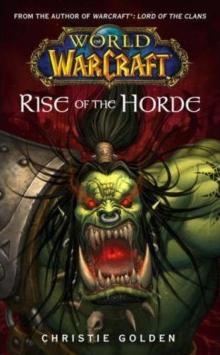 Rise of the Horde
Rise of the Horde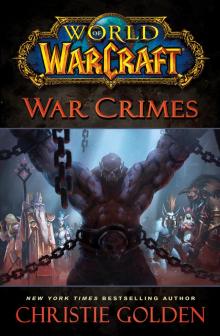 World of Warcraft: War Crimes
World of Warcraft: War Crimes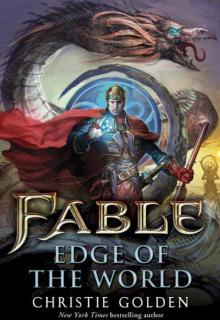 Fable: Edge of the World
Fable: Edge of the World Homecoming
Homecoming StarCraft II: Devil's Due
StarCraft II: Devil's Due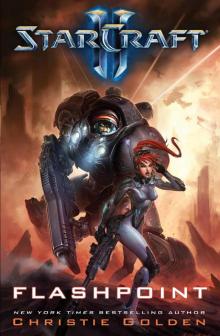 Starcraft II: Flashpoint
Starcraft II: Flashpoint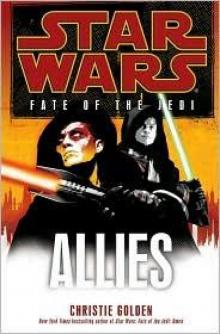 Allies
Allies Shadow Hunters
Shadow Hunters The Shattering: Prelude to Cataclysm wowct-1
The Shattering: Prelude to Cataclysm wowct-1 STAR TREK: VOY - Homecoming, Book Two - The Farther Shore
STAR TREK: VOY - Homecoming, Book Two - The Farther Shore King's Man and Thief
King's Man and Thief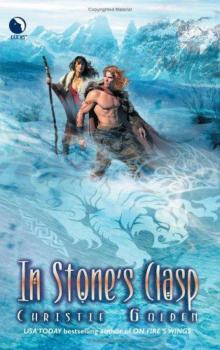 In Stone's Clasp
In Stone's Clasp Jaina Proudmoore: Tides of War
Jaina Proudmoore: Tides of War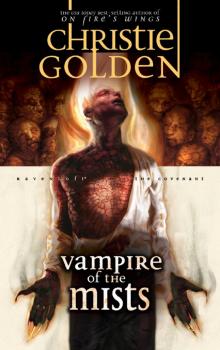 Vampire of the Mists
Vampire of the Mists Star Wars: Fate of the Jedi II: Omen
Star Wars: Fate of the Jedi II: Omen King's man and thief cov-2
King's man and thief cov-2 Star Trek
Star Trek StarCraft: Dark Templar: Twilight
StarCraft: Dark Templar: Twilight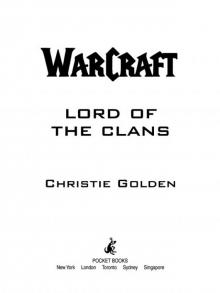 Lord Of The Clans
Lord Of The Clans ARKTIKA.1 (Short Story)
ARKTIKA.1 (Short Story)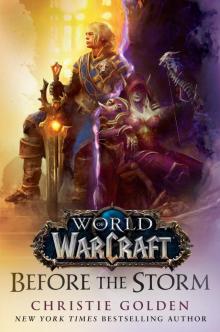 Before the Storm
Before the Storm STAR TREK: VOY - Homecoming, Book One
STAR TREK: VOY - Homecoming, Book One Shadow of Heaven
Shadow of Heaven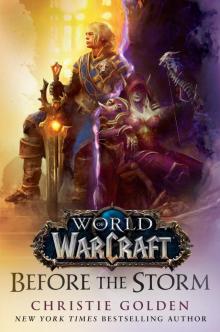 Before the Storm (World of Warcraft)
Before the Storm (World of Warcraft) Warcraft Official Movie Novelization
Warcraft Official Movie Novelization Flashpoint
Flashpoint STAR TREK: The Original Series - The Last Roundup
STAR TREK: The Original Series - The Last Roundup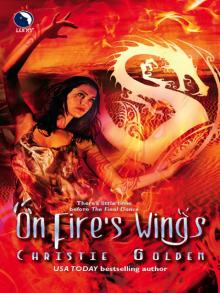 On Fire’s Wings
On Fire’s Wings Spirit Walk, Book One
Spirit Walk, Book One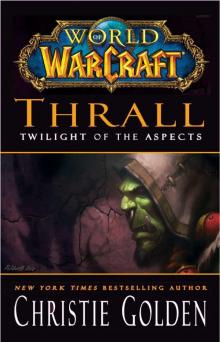 Thrall Twilight of the Aspects
Thrall Twilight of the Aspects Valerian and the City of a Thousand Planets
Valerian and the City of a Thousand Planets Warcraft
Warcraft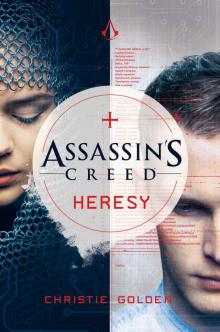 Assassin's Creed: Heresy
Assassin's Creed: Heresy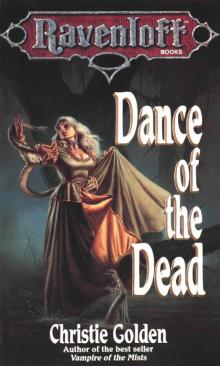 Dance of the Dead
Dance of the Dead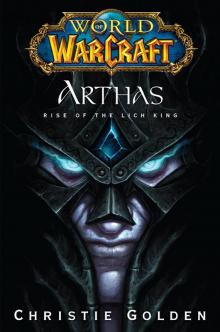 Arthas: Rise of the Lich King wow-6
Arthas: Rise of the Lich King wow-6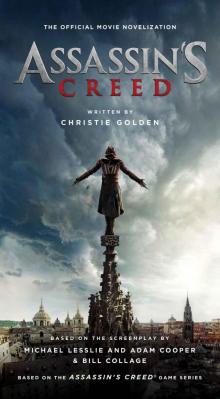 Assassin's Creed: The Official Movie Novelization
Assassin's Creed: The Official Movie Novelization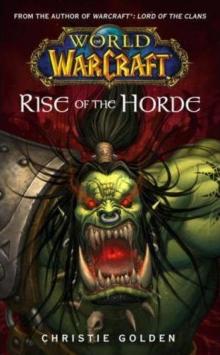 Rise of the Horde wow-2
Rise of the Horde wow-2 Dark Disciple
Dark Disciple Ghost Dance
Ghost Dance The Shattering
The Shattering Spirit Walk, Book Two
Spirit Walk, Book Two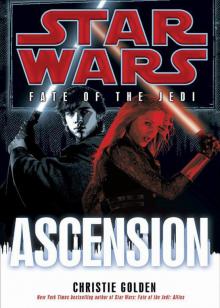 Star Wars: Fate of the Jedi: Ascension
Star Wars: Fate of the Jedi: Ascension Star Wars: Fate of the Jedi V: Allies
Star Wars: Fate of the Jedi V: Allies The Enemy Within
The Enemy Within Kindred Spirits
Kindred Spirits The Farther Shore
The Farther Shore Star Trek: Hard Crash (Star Trek: Starfleet Corps of Engineers Book 3)
Star Trek: Hard Crash (Star Trek: Starfleet Corps of Engineers Book 3) Twilight
Twilight